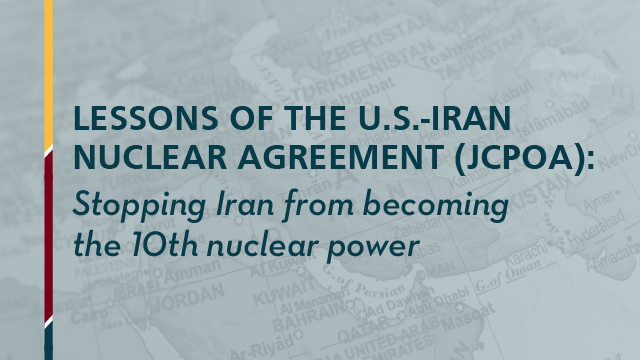
Based on his deep experience on nuclear proliferation issues and Iran, Mark Fitzpatrick contends that the 2015 Iran nuclear deal, formally called the Joint Comprehensive Plan of Action (JCPOA), rolled back Iran’s uranium enrichment program and enhanced inspector access in ways that blocked it from being able to rush to produce nuclear weapons. President Donald Trump withdrew from it in 2018 and all efforts since then to revive the deal have failed.
Join the Global Policy Area for a public forum with former US diplomat and researcher Mark Fitzpatrick to explore the implications of this foreign policy decision.
In particular, in exploring lessons from his involvement in the Iran issue, both as a practitioner and observer of diplomacy, Fitzpatrick will also consider how Tehran might be stopped from crossing that threshold when U.S. attention is distracted by other regional dynamics. Joined by UMN Associate Professor of Political Science Mark Bell, the pair will discuss the danger of a nuclear-armed Iran and opportunities for risk reduction.
Mark Fitzpatrick:
A former US diplomat, Mark Fitzpatrick is an Associate Fellow at the London-based International Institute for Strategic Studies (IISS). From 2005 to 2019, he headed the institute’s Non-Proliferation and Nuclear Policy Programme. He concurrently headed the IISS Washington office from 2015-2019. His books on nuclear dangers and related issues include Uncertain future: the JCPOA and Iran’s nuclear and missile programmes (2019) and The Iranian Nuclear Crisis: Avoiding worst-case outcomes (2008). He also produced book-length IISS strategic dossiers on Iran’s Nuclear, Chemical and Biological Capabilities: a net assessment (2011); Iran’s Ballistic Missile Capabilities: a net assessment (2010); and Nuclear Programmes in the Middle East: In the shadow of Iran (May 2008).
Mr. Fitzpatrick joined IISS in October 2005 after a 26-year career in the US Department of State, including as Deputy Assistant Secretary for Non-Proliferation (acting). His overseas postings included Vienna, in charge of liaison with the International Atomic Energy Agency, Seoul, Tokyo (twice) and Wellington. At the State Department in Washington, his positions included director of the regional affairs office of the Non-Proliferation Bureau, director of the regional affairs office of the South Asia bureau and North Korea desk officer.
A native of St. Paul and a liberal arts graduate of the University of Minnesota, Fitzpatrick earned a master’s degree in public policy from the Kennedy School of Government at Harvard University. He is a frequent media commentator on security issues and lectures throughout the world, including on cruise ships.
Mark Bell:
Mark Bell is an Associate Professor of Political Science at the University of Minnesota. His research examines issues relating to nuclear weapons and proliferation, international relations theory, and US and British foreign policy.
His first book, Nuclear Reactions: How Nuclear-Armed States Behave, examines how states change their foreign policies when they acquire nuclear weapons, was published in 2021 by Cornell University Press as part of the Cornell Studies in Security Affairs series. Other work has been published in journals including International Organization, International Security, International Studies Quarterly, Journal of Conflict Resolution, Journal of Strategic Studies, Texas National Security Review, and Defence Studies, and has been funded by organizations including the Stanton Foundation, the US Air Force Academy and Defense Threat Reduction Agency, the Smith Richardson Foundation, the Charles Koch Foundation, and the Tobin Project.
Mark Bell holds a Ph.D in Political Science from the Massachusetts Institute of Technology, a Masters in Public Policy from Harvard Kennedy School, where he was a Frank Knox Memorial Fellow, and a B.A. in Politics, Philosophy, and Economics from St. Anne’s College, Oxford University.